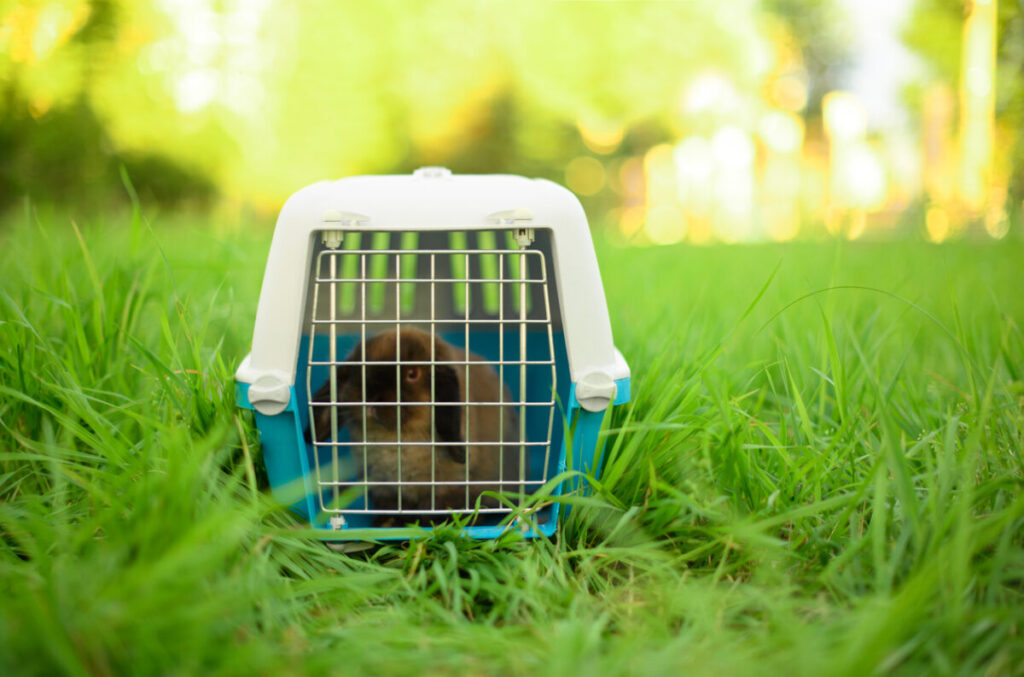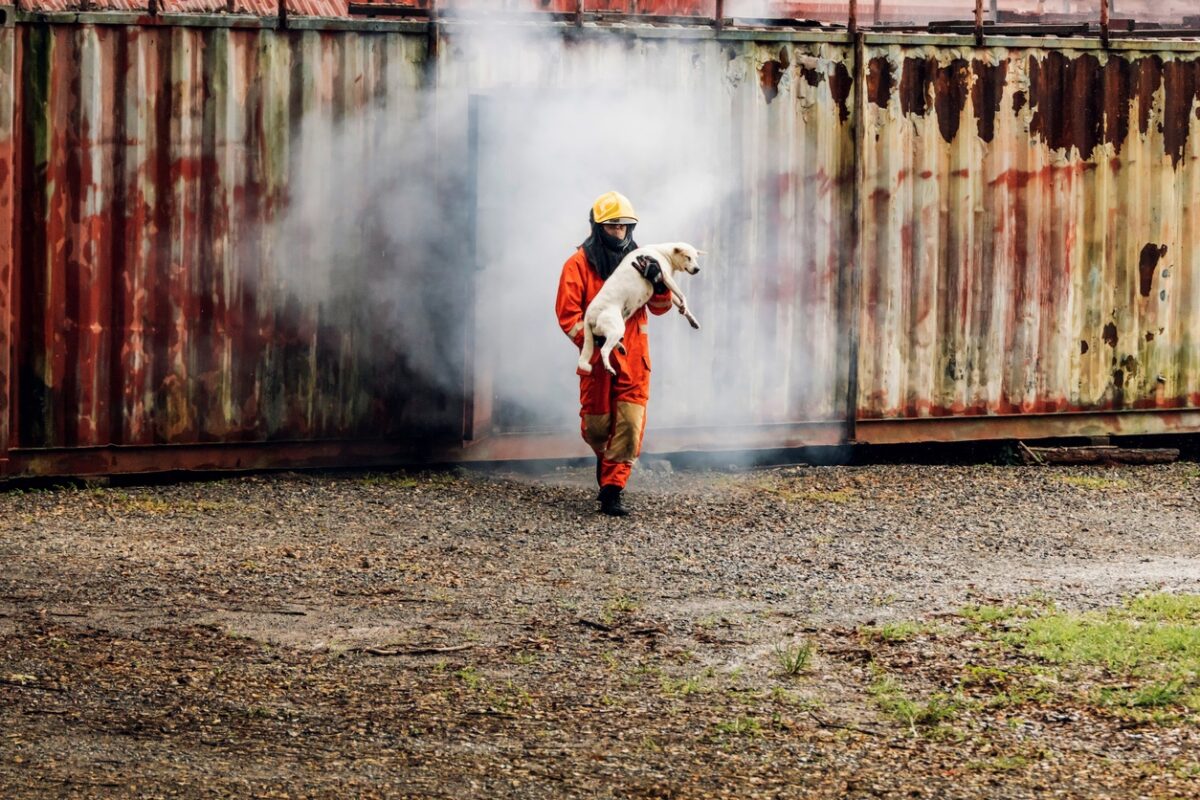When disaster strikes, every second counts. Being prepared can make all the difference for your pet’s safety and well-being. At Hammond Veterinary Hospital, we know your pets are more than just animals—they’re family. Here’s how you can ensure they’re protected when the unexpected happens.
Marlow’s Reality: Why Disaster Preparedness is Vital
Like many parts of the state, Marlow, Oklahoma, is no stranger to natural disasters. Residents have faced various challenges in recent years, from severe storms and tornadoes to flooding and wildfires. For example:
Tornadoes: Oklahoma lies in “Tornado Alley,” where tornadoes are a familiar and terrifying reality. These storms can develop rapidly, leaving little time to gather your family and pets.
Flooding: Heavy rainfall, particularly in the spring and early summer, has led to flash floods in the region, making some areas impassable and requiring quick evacuation.
Wildfires: During dry seasons, wildfires have threatened rural and suburban areas, forcing residents to evacuate with little notice.
In addition to natural disasters, human-caused disasters, such as industrial accidents, chemical spills, and building fires, can be just as devastating as natural disasters, often with little to no warning. These events can occur due to human error, negligence, or even malicious intent, leading to widespread damage and posing significant risks to both humans and animals.
In any of these situations, having a well-thought-out disaster plan that includes your pets can mean the difference between life and death. Disasters can happen with little to no warning, and being prepared ensures you can evacuate quickly and safely with your pets.
Microchipping: Your Pet’s Ticket Home
Imagine the panic of losing your pet in the chaos of a disaster. Microchipping is one of the best ways to ensure a happy reunion if you become separated. A microchip, no bigger than a grain of rice, holds a unique ID number that connects to your contact information. When scanned by a veterinary clinic or shelter, it’s your pet’s direct line home.
A Real-Life Story: The Miracle of Microchipping
Rachael Jones and her cat, Quazi, experienced the miracle of microchipping first-hand during a devastating fire. After Rachael dropped Quazi from her balcony to a blanket to save his life, he fled in fear. She lost him for six agonizing months. But thanks to his microchip, a Good Samaritan brought him to a shelter, where staff used the microchip data to contact Rachael. Their emotional reunion is a powerful reminder of how microchipping can save lives.
American Animal Hospital Association
Ensure your contact information is always up to date in the microchip registry. If you still need to microchip your pet, consider scheduling an appointment with us. The procedure is quick, painless, and can give you peace of mind.
Your Pet’s Emergency Kit: Pet Disaster Preparedness Essentials You Can’t Forget
Creating a disaster preparation kit for your pets is essential. Here’s a checklist of items you should have ready to go:
Pet Carrier
Have a carrier for each pet with their name, your name, and contact information clearly labeled.
Food and Water
Have at least two weeks’ worth of emergency food and water for each pet.
Sanitation Supplies
Litter and litter box for cats, and plastic bags for dogs’ waste.
Medications
Ensure you have a two-week supply of any medications your pet requires.
Medical Records
Keep a copy of vaccination records, prescriptions, and your pet’s medical history in a waterproof container.
Leashes and Harnesses
Have sturdy leashes or harnesses to keep your pets secure.
Microchip Information
Have your pet’s microchip number readily available.
Add specific items your pet may need, such as calming treats, comfort toys, or blankets. The goal is to be ready to leave at a moment’s notice without scrambling for essential supplies.
Pet Disaster Preparedness for Exotic Pets

When it comes to disaster preparedness, exotic pets, such as birds, reptiles, small mammals, and even fish, require special considerations. These pets often have unique environmental needs, making it even more crucial to plan for their safety.
Birds
Birds are highly sensitive to environmental changes. Ensure their cages are secure and covered to minimize stress during a disaster. Have a travel cage ready, and remember to pack a supply of birdseed, water, and any necessary supplements. Also, include a few comfort items like favorite perches or toys to help reduce anxiety.
Reptiles
Reptiles often require specific temperature and humidity levels. Prepare a portable heat source, like heat packs or a battery-operated heater, to keep their environment stable during an emergency. Ensure their terrarium or travel container is secure, and pack an adequate supply of their usual food and water. For aquatic reptiles, consider a small, portable tank with a water filtration system.
Small Mammals (Rabbits, Guinea Pigs, Hamsters)
Small mammals can easily become stressed in chaotic situations. Prepare a well-ventilated carrier with bedding, food, water, and comfort items. Make sure their carrier is escape-proof and easy to transport. Include any necessary grooming supplies, as these pets often require regular maintenance.
Fish
For those with fish, power outages can be particularly problematic. Have a battery-operated air pump on hand to keep the water oxygenated. Consider a portable, insulated container to maintain water temperature during a potential evacuation.
Insects and Arachnids
For those who keep insects or arachnids, ensure you have a secure, portable container and any necessary habitat requirements, such as a heat source or specific substrate. These pets may require special handling, so plan accordingly.
By preparing for the unique needs of your exotic pets, you ensure their safety and well-being, just like any other beloved family member. At Hammond Veterinary Hospital, we can help guide you in creating a disaster preparedness plan tailored to your exotic pets’ specific needs. Contact us today to learn more.
Do You Have an Emergency Evacuation Plan?
Disasters are stressful for everyone, including your pets. A clear evacuation plan is crucial.
Carrier Training
Train your pets to feel comfortable in their carriers by using them regularly, making them a safe and familiar space.
Practice Evacuations
Practice evacuating with your pets. Take them for car rides to get them used to traveling and familiarize yourself with places your pet might hide when scared. You need to be able to access them quickly.
Family Coordination
Have your family practice evacuating so everyone knows what to do, where to find the pets, and where to meet.Have a contingency plan in case you are not home when an evacuation order is announced. Find out if a trusted neighbor or family member that lives close by would be willing to take your pets and meet you at a prearranged location.
Pet-Friendly Evacuation Shelters, Motels, or Hotels
Find out in advance if there is a pet-friendly emergency shelter in your area by contacting your county emergency management office or local animal shelter. If there is no emergency animal shelter, make a list of pet-friendly motels or hotels in your area.
For more tips and information about preparing for a disaster, visit PetFriendlyTravel.com
Preparing for disasters in Marlow isn’t just about protecting your property—it’s about safeguarding every family member, including your pets.
Conclusion: Stay Prepared, Stay Safe
When a disaster strikes, there is no time to prepare. By having a pet disaster preparedness kit and evacuation plan in place, you can quickly and effectively respond to any emergency. Your preparedness can mean the difference between life and death for your beloved pets. Don’t wait until it’s too late—take action today by scheduling a microchipping appointment, assembling your pet’s disaster kit, and practicing your evacuation plan. At Hammond Veterinary Hospital, we’re here to help you every step of the way. Contact us now to ensure your pets are protected when needed.
Your Caring Team
Hammond Veterinary Hospital

